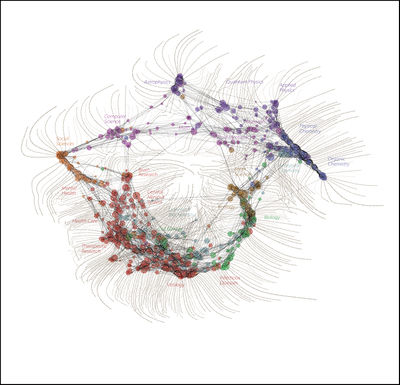Difference between revisions of "Extra:citation visualizations"
KevinYager (talk | contribs) (→Additional Information) |
KevinYager (talk | contribs) (→General Visualization Tools (that could be used for citation networks)) |
||
| Line 17: | Line 17: | ||
* [https://d3js.org/ D3.js]: JavaScript libraries for visualization. Well-suited to interactive web-based analytic tools. | * [https://d3js.org/ D3.js]: JavaScript libraries for visualization. Well-suited to interactive web-based analytic tools. | ||
** [https://github.com/d3/d3/wiki/Gallery Gallery] | ** [https://github.com/d3/d3/wiki/Gallery Gallery] | ||
| + | * [https://plot.ly/feed/ plotly]: Data science collaboration platform. | ||
| + | ** [https://plot.ly/ipython-notebooks/network-graphs/ Network graphs] | ||
| + | ** [https://plot.ly/python/3d-network-graph/ 3D network graphs] | ||
| + | * [http://www.cytoscape.org/ Cytoscape]: Network analytics platform. | ||
==Additional Information== | ==Additional Information== | ||
Revision as of 17:16, 16 November 2016
Existing tools for visualizing and data-analytics of citation networks
- VOSviewer: Tool for constructing and visualizing bibliometric networks. Offers text mining functionality that can be used to construct and visualize co-occurrence networks of important terms extracted from a body of scientific literature.
- CiteSpace: Java application for visualizing and analyzing trends and patterns in scientific literature.
- Relationships among scientific paradigms. Well-publicized "map of science", generated using bespoke software. (Was reprinted in Nature, Discovery Magazine, SEED, etc.)
General Visualization Tools (that could be used for citation networks)
- Python: General-purpose high-level programming language.
- matplotlib for generalized plotting
- [iPython network citation example]
- NetworkX: Package for the creation, manipulation, and study of the structure, dynamics, and functions of complex networks.
- Snap.py: Python interface to SNAP, providing high-performance node/network layout and visualization.
- D3.js: JavaScript libraries for visualization. Well-suited to interactive web-based analytic tools.
- plotly: Data science collaboration platform.
- Cytoscape: Network analytics platform.
Additional Information
- Potentially useful Google searches:
- visualization of citation networks
- visualization of citation networks (Image Search)
- network of scientific collaboration (Image Search)
- Python data visualization: Comparing 7 tools
- Top 30 Social Network Analysis and Visualization Tools
